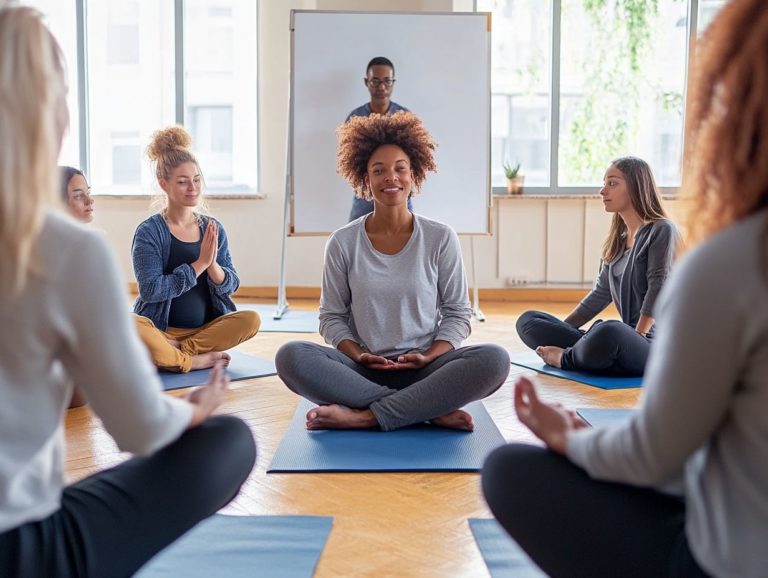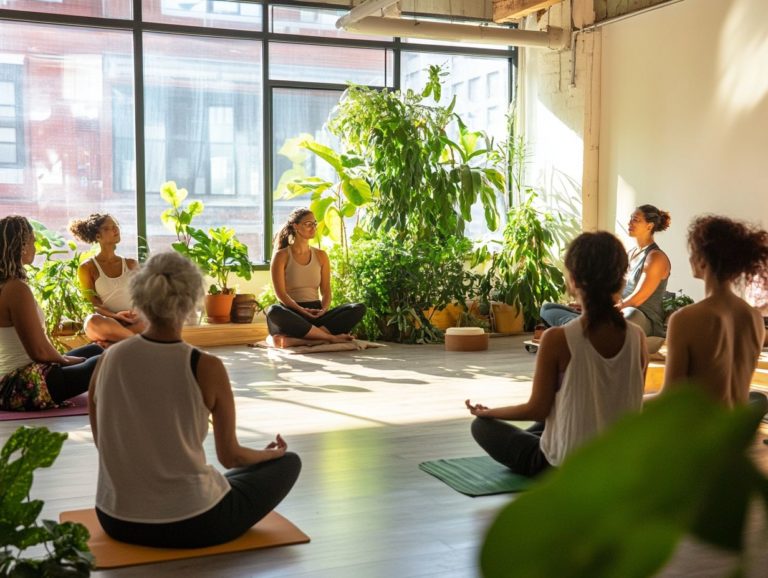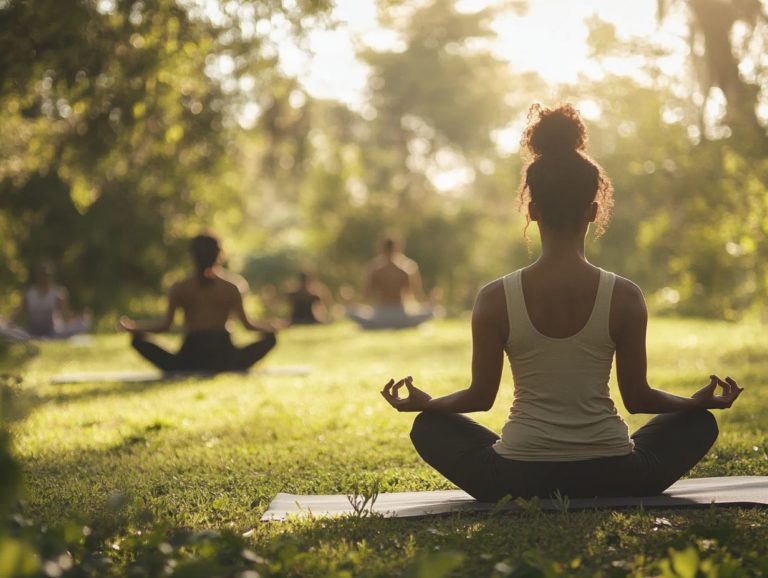24. How to Integrate Holistic Practices into Daily Life
Holistic health and wellness invite you to nurture the mind, body, and spirit as interconnected elements of your overall well-being.
This exploration will not only transform your daily routine but also elevate your entire life! It delves into what holistic practices are and how you can seamlessly weave them into your daily routine. From elevating your physical health through exercise and nutrition to enhancing your mental and emotional resilience with mindfulness and stress management techniques, you ll discover practical tips and insights along the way.
Uncover how cultivating strong relationships and a sense of purpose can further enrich your holistic journey. Embrace the transformative power of a holistic lifestyle and watch as it unfolds in your life!
Contents
Key Takeaways:
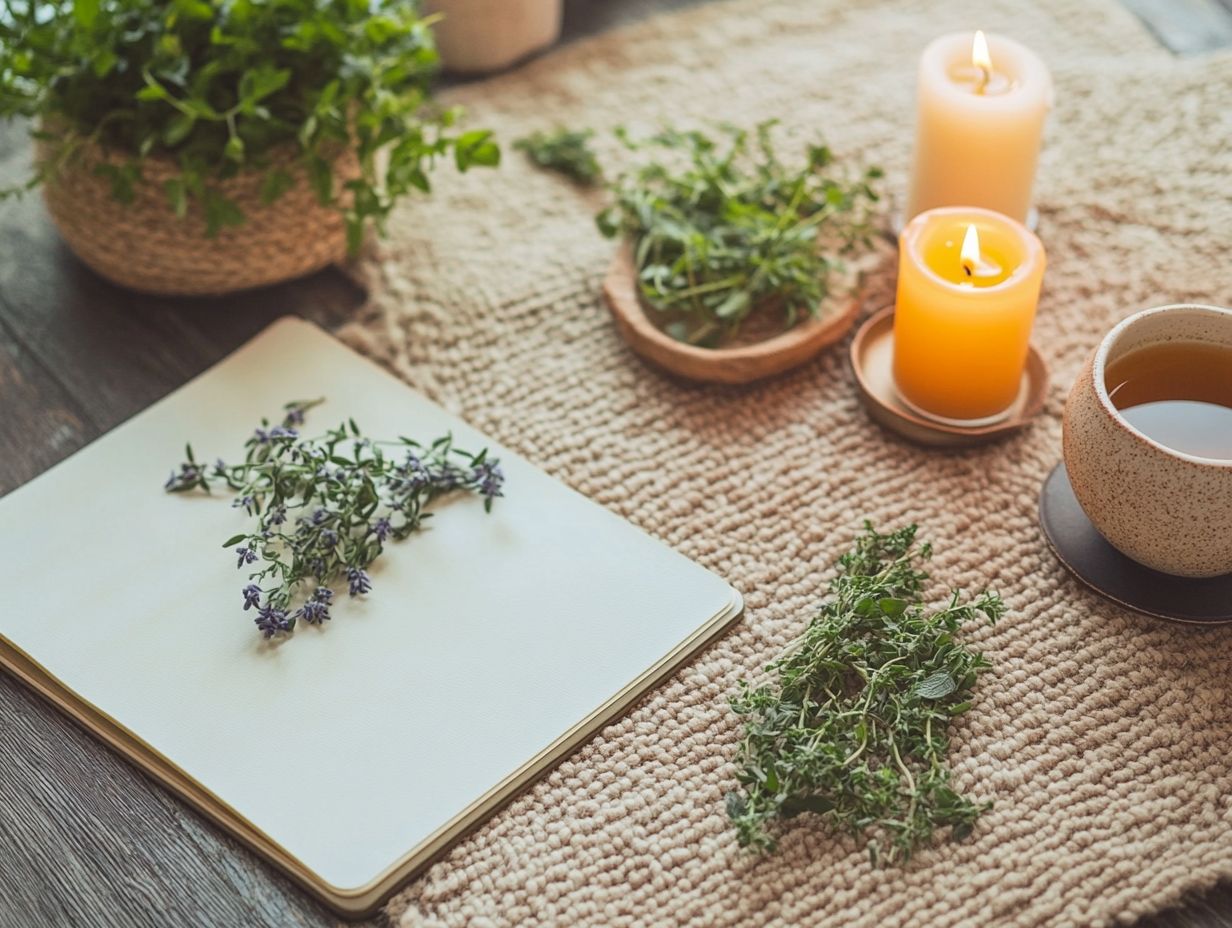
- Embrace a holistic approach by understanding that all well-being aspects are connected.
- Start small by identifying areas for improvement and choosing practices that fit your needs.
- Incorporate activities, mindfulness, stress management techniques, and social connections for better health.
Understanding Holistic Practices
Understanding holistic practices is essential for anyone aiming to elevate their overall health and well-being. This complete approach seamlessly integrates physical, mental, and emotional health, and learning how to incorporate energy healing in daily life can help you grow and bounce back from challenges.
By recognizing the connections among these areas, you can adopt effective coping strategies for managing anxiety and stress, enhance your mindfulness, and refine your self-care routines.
In this exploration, you will delve into the principles of holistic health, discover the significance of lifestyle changes, and learn how to harmonize various aspects of your life for optimal emotional and physical well-being.
Defining Holistic Health and Wellness
Holistic health and wellness highlight the significance of integrating mental, emotional, and physical well-being into your daily life, cultivating a balanced approach to overall health.
By acknowledging that each of these components interacts and influences the others, this approach invites you to cultivate mindfulness, manage stress, and nurture emotional resilience.
Unlike traditional health paradigms that often treat symptoms in isolation, the holistic perspective emphasizes the interconnectedness of all facets of your life. This comprehensive view fosters not merely the absence of disease but a vibrant state of well-being, enhancing your quality of life.
By embracing this holistic viewpoint, you may find yourself experiencing reduced stress, improved emotional stability, and greater physical vitality, ultimately enabling you to take charge of your health journey.
Incorporating Holistic Practices into Daily Life
Incorporating holistic practices into your daily life is a transformative journey that elevates your overall well-being. By seamlessly integrating self-care, mindfulness, exercise, and nutrition into your routines, you create a framework for cultivating emotional support and enhancing mental clarity. To learn more, check out how to incorporate mind-body practices into daily life.
This also boosts your energy levels while reducing stress and anxiety. Embracing simple yet effective habits allows you to establish a balanced lifestyle that fosters healing and emotional insight. This section explores ways to include holistic practices in your life.
Identifying Areas for Improvement
Identifying areas for improvement in your holistic health journey is essential for achieving optimal well-being, and it all starts with some thoughtful self-reflection and a careful assessment of your current lifestyle choices.
This process calls for a deep dive into various aspects of your life, including mental health, physical fitness, and emotional balance. By taking the time to evaluate how these elements interact and influence your daily life, you can uncover vital insights that pave the way for meaningful lifestyle changes.
Engaging in self-care practices think mindfulness, regular exercise, and balanced nutrition not only promotes personal growth but also nurtures your overall wellness. Recognizing the connections among these areas enhances your ability to create a fulfilling and healthy lifestyle, ultimately leading to sustained improvement and happiness.
Choosing the Right Practices

Choosing the right holistic practices means tailoring strategies that resonate with your unique needs and goals. For example, exploring ways to incorporate naturopathy can help you truly maximize the benefits of mindfulness, exercise, and nutrition.
Recognizing your unique journey is key! Everyone s path to wellness is distinct, shaped by personal experiences and circumstances.
Mindfulness is a powerful tool that enables you to cultivate awareness and presence. This can significantly enhance your emotional resilience.
Incorporating regular physical activity elevates your mood and instills a rewarding sense of achievement.
Nutrition is equally essential. A balanced diet can dramatically improve your energy levels and mental clarity.
By exploring these practices and adapting them to fit your lifestyle, you can craft a holistic approach, such as transitioning to an integrative health lifestyle, that supports your overall well-being.
Physical Practices for Holistic Health
Embracing physical practices for holistic health is essential for enhancing your overall well-being. These practices include exercise, nutrition, and lifestyle choices that influence both your physical and mental health.
Nurturing these aspects creates a foundation for a more vibrant and balanced life.
Exercise and Movement
Exercise and movement are essential pillars of holistic health. They play a significant role in physical fitness, emotional well-being, and stress management.
Engaging in exercise like running, strength training, or yoga offers profound benefits for your cardiovascular health. This enhances heart function and circulation.
Aerobic exercises boost heart health, while strength training enhances muscle resilience and metabolic rates. Don t overlook mind-body practices like yoga and tai chi; they improve flexibility and promote emotional stability by reducing anxiety.
To seamlessly weave movement into your daily routine, consider these strategies:
- Break long sitting spells with short walks.
- Opt for stairs instead of elevators.
- Incorporate short bursts of activity throughout your day.
Even simple stretching or household tasks can improve your physical well-being and help alleviate stress.
Diet and Nutrition
A balanced diet and proper nutrition are essential for maintaining overall health and enhancing emotional well-being. They also support lifestyle changes that promote holistic health.
Incorporating a variety of nutrients into your meals does more than fuel your body; it builds resilience against stress and anxiety. Diets rich in whole foods think fruits, vegetables, lean proteins, and healthy fats significantly impact your mood and cognitive function.
This holistic approach to eating encourages mindfulness and self-awareness, setting the stage for healthier habits. Recognizing the interconnectedness of your food choices, mental clarity, and emotional stability helps you make informed dietary decisions that elevate your well-being.
Mental and Emotional Practices for Holistic Health
Mental and emotional practices play a vital role in achieving holistic health. By focusing on mindfulness, mastering stress management techniques, and developing effective coping strategies, you can nurture your emotional well-being.
Start your journey to holistic health today! Explore these practices and see what works for you!
Meditation and Mindfulness

Meditation and mindfulness serve as powerful tools for enhancing emotional well-being. These practices help you discover peace amidst the chaos of daily life.
By incorporating techniques such as breathing exercises, body scans, and guided imagery, you can effectively reduce stress and sharpen your focus.
Engaging in these practices nurtures greater awareness of your thoughts and emotions. This equips you to respond more healthily to life s challenges.
Integrating mindfulness into everyday activities, like mindful eating paying full attention to what you are eating and savoring each bite or mindful walking amplifies these benefits, enhancing both your mental clarity and emotional resilience.
As more individuals delve into these mindful approaches, the potential for transformative change in their mental health becomes increasingly clear.
Stress Management Techniques
Effective stress management techniques are vital for maintaining your emotional well-being. Practices like breathing exercises and mindfulness can serve as powerful coping strategies in your daily life.
Incorporating these methods into your routine can significantly boost your ability to handle life’s demands.
Techniques such as yoga, which blends physical movement with relaxation, along with a technique where you relax each muscle group one by one, can further ease tension and promote mental clarity.
Engaging in creative outlets, like art or writing, offers a therapeutic release that can be incredibly beneficial.
Building and nurturing healthy relationships, along with establishing a supportive social network, is crucial for enhancing your emotional resilience. By embracing these holistic health practices, you can equip yourself with a robust toolkit for managing stress and elevating your overall quality of life.
Social and Spiritual Practices for Holistic Health
Social and spiritual practices are essential elements of holistic health. They underscore the significance of community, emotional support, and meaningful connections in promoting your overall well-being.
Engaging in these practices enriches your life, fostering a sense of belonging and nurturing the spirit.
Building Strong Relationships
Building strong relationships is essential for fostering holistic health, as social connections and emotional support play a significant role in your overall well-being.
These bonds can act as a buffer against stress, enabling you to face life’s challenges with greater resilience.
In a community where you feel connected, sharing experiences and resources cultivates a sense of belonging, vital for your mental and emotional health.
A robust support system not only motivates healthier lifestyle choices but also encourages a deeper understanding of yourself through shared journeys.
Ultimately, prioritizing your social ties enhances your physical, mental, and spiritual well-being, showcasing the profound impact that community has on holistic health.
Cultivating a Sense of Purpose and Connection
Cultivating a sense of purpose and connection is vital for your holistic health. It enriches your emotional well-being and fosters a deeper bond with yourself and your community.
When you actively engage in spiritual practices, like mindfulness meditation or yoga, you often become more aware of your internal thoughts and feelings, which enhances your understanding of what truly matters.
This introspection not only clarifies your personal values but also deepens your connection with others.
Being part of a supportive community through volunteering or group activities can further solidify these relationships, empowering you to contribute meaningfully.
Ultimately, this intertwined sense of purpose both personal and collective serves as a foundation for your emotional stability. It promotes resilience in the face of daily stress and facilitates a more fulfilling existence.
Frequently Asked Questions
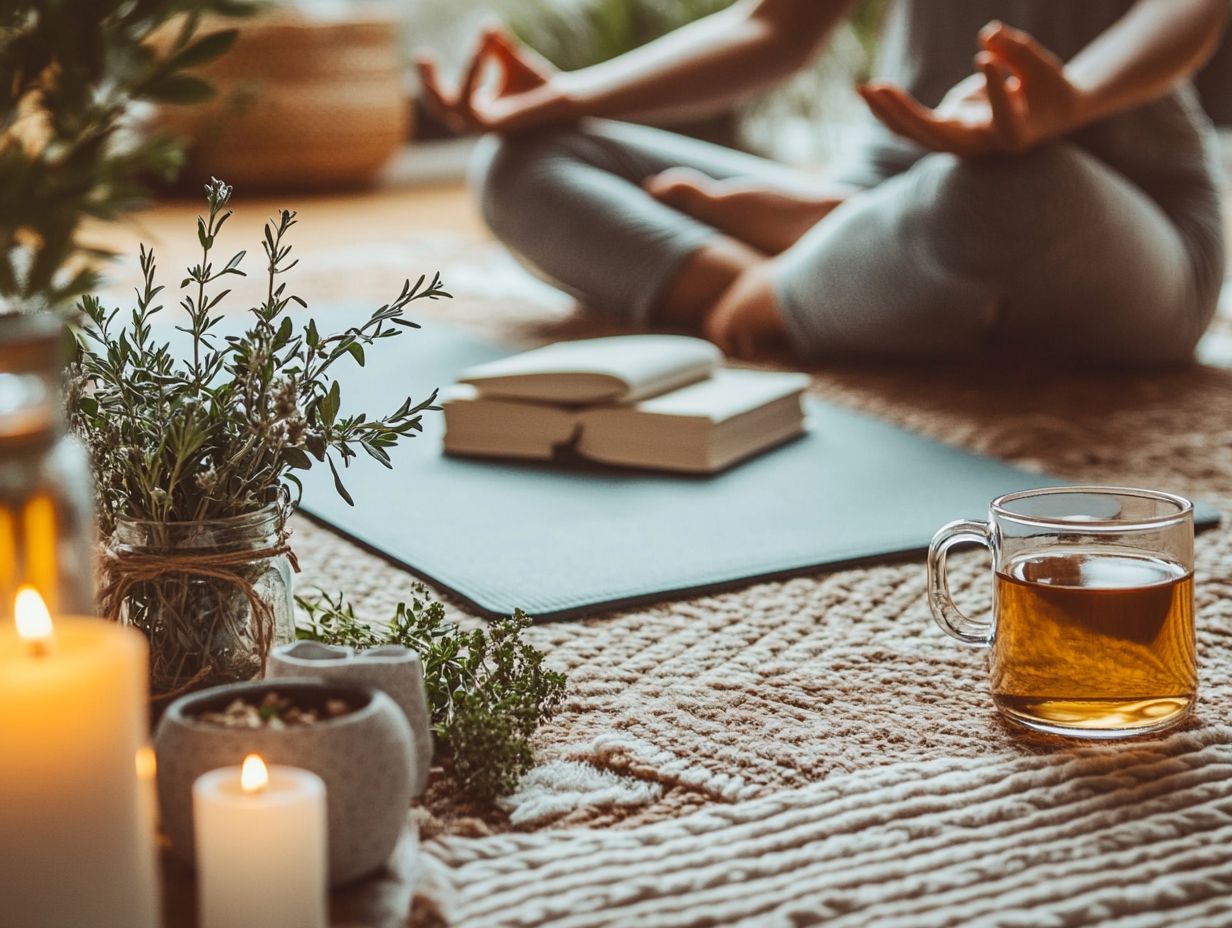
Start today by integrating these practices into your life for immediate benefits. For more guidance, explore how to incorporate yoga into integrative health. Don’t wait to transform your well-being!
1. What are holistic practices?
Holistic practices encompass various techniques aimed at enhancing your overall well-being, including integrative health approaches for holistic healing. They focus on balancing your mind, body, and spirit.
2. Why is it important to use holistic practices in daily life?
Using holistic practices helps reduce stress and encourages relaxation. You’ll also notice improvements in your physical and mental health.
3. How can I add holistic practices to my routine?
Incorporate holistic practices by practicing mindfulness and eating a nutritious diet. Additionally, consider exploring integrative health tools for daily living to enhance your routine. Make sure to include regular physical activity and set aside time for self-care.
4. What are some examples of holistic practices?
Examples of holistic practices include yoga and meditation. You can also explore acupuncture, which is a technique that involves inserting thin needles into the skin to relieve pain, as well as aromatherapy, massage therapy, and Reiki. These are great for relaxation and stress relief.
5. Can anyone practice holistic techniques?
Absolutely! Holistic techniques are for everyone, regardless of age or background. You can personalize them to meet your unique needs.
6. How can holistic practices benefit me?
Holistic practices offer numerous benefits, including less stress and anxiety. They promote better physical and mental health, leading to a more balanced and fulfilling life.



